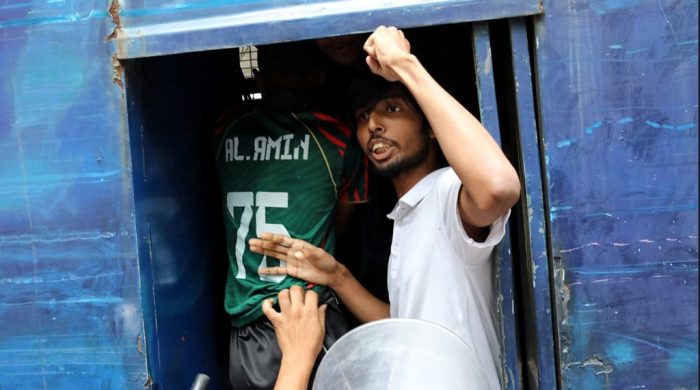Protesting students detained, demos held in many places

- Update Time : Monday, July 29, 2024
- 35 Time View

Students protesting under the banner of Students Movement Against Discrimination organised protest rallies in different places, including Dhaka city and elsewhere in the country to press home their demands.
Protesters tried to gather at the Science Laboratory crossing, ECB Chattar in Mirpur, Paltan, Dhanmondi and other areas in Dhaka but they could not follow through as law enforcers detained several students.
A huge number of law enforcers were present at most crossings of the capital city as quota protesters took to the streets again after a week.
Police on Monday noon detained several protesters who gathered at Dhaka’s Purana Paltan as part of their pre-scheduled demonstration, United News of Bangladesh reported.
The protesters were staging rallies against the detention of coordinators of the quota reform movement by the Detective Branch of Dhaka Metropolitan Police.
Rajshahi University students brought out a protest procession from Binodpur Bazar to the university’s main gate.
They also held demonstrations blocking Dhaka-Rajshahi Highway from 11:30am to 12:00noon.
In a video message sent out from the DB custody on Sunday night, Nahid, a coordinator of the Students Movement Against Discrimination, announced of withdrawing their programmes and urged the government to reopen the universities.
Hours after Nahid’s video message on late Sunday, another coordinator Abdul Kader in a statement announced protest rallies across the country.
Kader alleged that the DB coerced the coordinators into signing a scripted statement, despite several hundred sacrificed their lives during the unrest.
Earlier on Friday, the DB took three student leaders—Nahid Islam, Abu Baker Mazumdar, and Asif Mahmud—in their custody forcibly from Gonoshasthaya Nagar Hospital in the capital’s Dhanmondi area.
Three of them were reportedly picked by security agencies in the past week and faced physical and torture.
DB also picked up two other coordinators, Sarjis Alam and Hasnat Abdullah, on Saturday evening and another on Nusrat Tabassum.
All the coordinators issued a joint statement from the DB office in Dhaka.
Earlier, protesting students for quota reform in government jobs on Saturday issued a 24-hour ultimatum to meet their three-point demand, including enactment of a law in the parliament through forming a commission, and warned of a street movement tougher than ‘complete shutdown’.
Their other demands are the return of those who disappeared and the release of arrested protesters with the withdrawal of false cases; and the removal of those, from minister to constable, involved in the ‘mass killings’.
Students’ protests that had been continuing since early July seeking reform in quotas for government jobs turned violent following an attack on protesters by the ruling party student body, the Bangladesh Chhatra League, on July 16.
The protests of students turned violent on July 15 after the student wing of the ruling Awami League, the Bangladesh Chhatra League, attacked the protesters on the Dhaka University campus in the presence of police.
The resulting backlash prompted the government to launch a brutal crackdown on protesters, leaving at least 212 killed in clashes and their aftermath between July 16 and July 27.
New Age correspondents found the figure visiting hospitals and speaking to police, fire service officials, and family members of victims.















